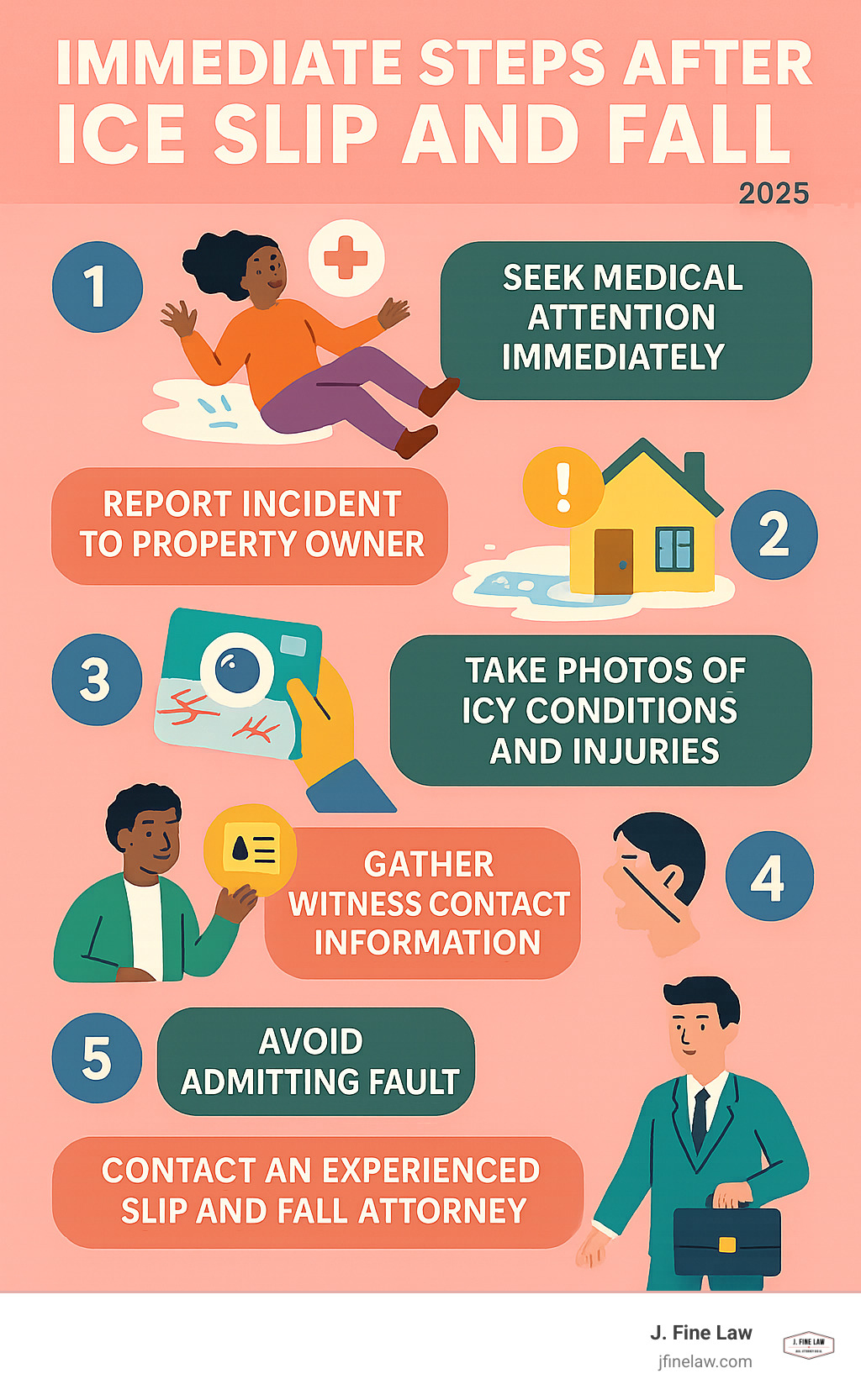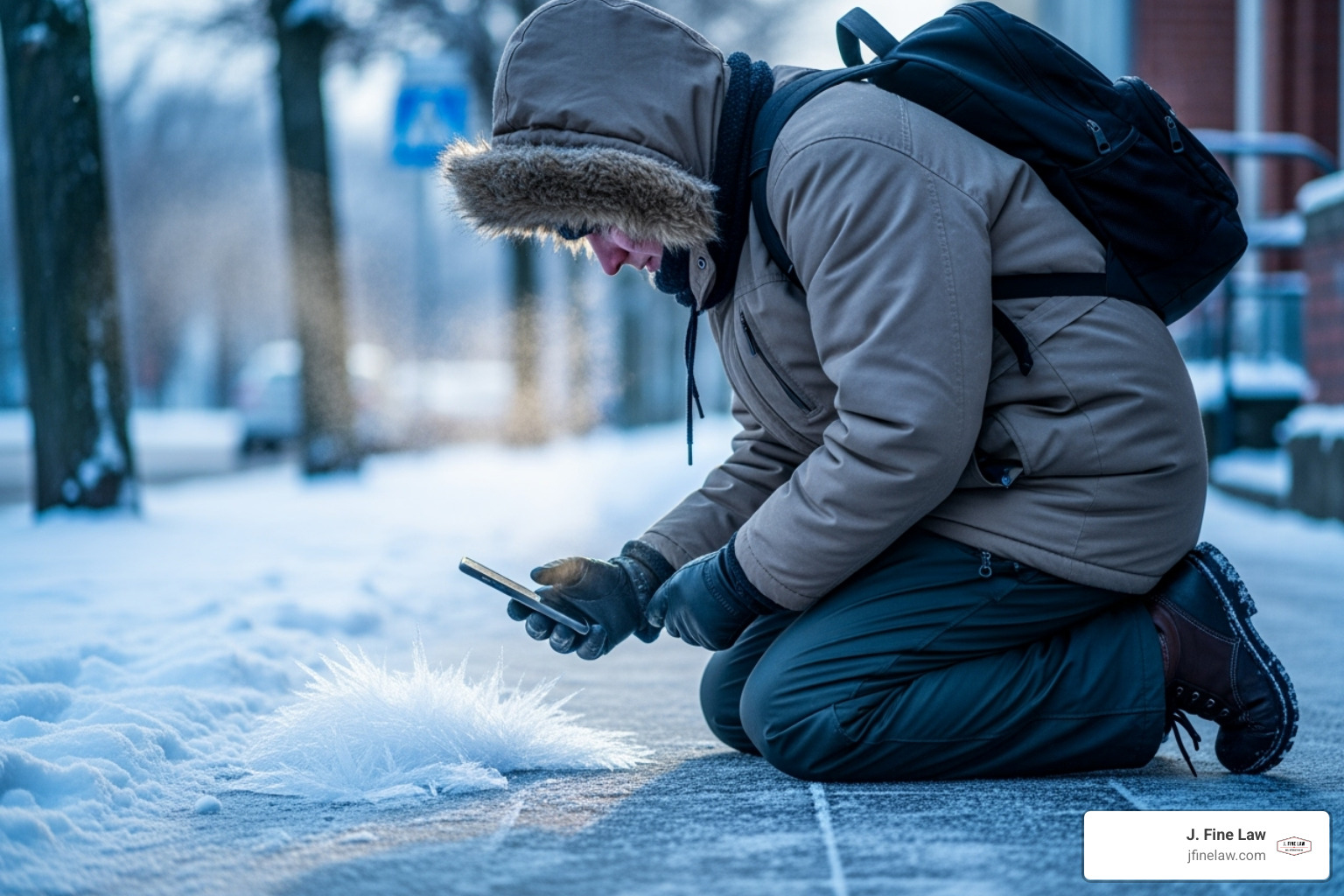Why Philadelphia Ice Slip and Fall Victims Need Legal Protection
If you’re searching for a philadelphia ice slip and fall lawyer, you need immediate answers about your legal rights. Here’s what you need to know:
Quick Facts:
- You can sue for ice slip and fall injuries if property owner negligence is proven.
- Two-year deadline to file a lawsuit (six months for government property).
- Compensation is available for medical bills, lost wages, and pain and suffering.
- Free consultations are available from experienced attorneys.
- No upfront costs with contingency fee arrangements.
Philadelphia winters create dangerous conditions that lead to thousands of slip and fall claims annually. Ice storms, sleet, and freezing rain turn sidewalks and parking lots into hazards. These accidents can cause serious injuries like broken bones, head trauma, and spinal damage, leaving victims with mounting medical bills and lost income.
Property owners and their insurers often try to avoid responsibility. However, they have a legal duty to maintain safe conditions. When they fail to clear ice and snow in a reasonable time, they can be held liable for your injuries.
I’m Jason Fine, a ten-time Pennsylvania Super Lawyer nominee with over 25 years of experience. My team at J. Fine Law has helped philadelphia ice slip and fall lawyer clients recover millions in compensation by successfully handling thousands of premises liability cases.
Explore more about philadelphia ice slip and fall lawyer:
The Aftermath of a Fall: Critical First Steps and Common Injuries
When you fall on an icy sidewalk, the first few moments are overwhelming. What you do next can make or break a future legal claim. Taking the right steps protects your health and your legal rights. An experienced philadelphia ice slip and fall lawyer can guide you through this process from the very beginning.
What to Do Immediately After an Ice Slip and Fall
- Get medical help first. Even if you feel “okay,” some serious injuries like concussions or a traumatic brain injury (TBI) have delayed symptoms. A medical visit protects your health and creates a record linking your injuries to the fall.
- Report the incident. Inform the property owner immediately, whether it’s a store, apartment complex, or private home. Ask for a copy of the incident report.
- Document the scene. Use your phone to take photos of the exact icy spot that caused your fall, the surrounding area, lighting, and any warning signs. Also, photograph your injuries.
- Talk to witnesses. If anyone saw you fall, politely ask for their name and phone number. Their testimony can be invaluable.
- Be careful what you say. Avoid saying things like “I’m clumsy” or “I should have been more careful.” Do not give official statements to insurance companies without first speaking to a Philadelphia Slip and Fall Injury Lawyer.
Common Injuries from Icy Falls
A fall on ice can cause surprisingly serious injuries. Over 25 years, I’ve seen the devastating impact these accidents can have.
- Broken bones: Fractures in arms, legs, ankles, and hips are common, especially wrist fractures from trying to break the fall.
- Back and neck injuries: These can range from painful muscle strains to serious herniated discs or pinched nerves, often leading to chronic pain.
- Spinal cord damage: In severe cases, a hard fall can cause partial or complete paralysis, requiring long-term care.
- Head injuries: A bump on the head could indicate a concussion, traumatic brain injury, or skull fracture. Immediate medical evaluation is critical.
- Soft tissue injuries: Painful sprains, strains, and torn ligaments (like ACL or rotator cuff tears) can limit mobility and require extensive physical therapy.
- Bruises and cuts: Deep bruising can be extremely painful, and lacerations may require stitches and leave permanent scars.
These injuries often require extensive medical treatment and time off work, making it essential to understand your legal rights.
Liability in Philadelphia: Who is Responsible for Your Fall on Ice?
After an icy fall, a key question emerges: who is responsible? Philadelphia ice slip and fall cases are governed by premises liability law, which means property owners have a duty to keep their spaces safe. Proving fault requires understanding specific Pennsylvania legal rules. As your Philadelphia Slip and Fall Accident Lawyer, we master these complexities to determine liability.
Can You Sue for Slipping on Ice in Philadelphia?
Yes, you can sue for slipping on ice in Philadelphia. However, a fall on someone’s property doesn’t automatically mean they are liable. You must prove the property owner was negligent—that they failed in their legal duty to keep their property reasonably safe for visitors. When a property owner knows (or should know) about a dangerous icy condition and fails to address it, they can be held liable. This applies to commercial businesses, residential properties, and some public spaces.
For a deeper dive, see our guide: Your Complete Guide to Slip and Fall Injury Lawyers in Philadelphia.
Property Owner Responsibilities for Snow and Ice
Property owners must clear ice and snow from their property within a reasonable timeframe after a storm stops. This responsibility covers sidewalks, parking lots, and entryways. What is “reasonable” depends on the storm’s severity and when it ended. Commercial properties are held to a higher standard than residential ones because they invite the public onto their property for business. However, landlords and homeowners also have a duty to keep their property safe for visitors. A Philadelphia Parking Lot Slip and Fall Accident Lawyer can explain how these duties apply in specific situations.
Understanding the ‘Hills and Ridges Doctrine’ in Pennsylvania
Pennsylvania’s ‘Hills and Ridges Doctrine’ makes these cases tricky. Generally, property owners are not liable for injuries from natural accumulations of ice and snow. To hold a property owner liable under this doctrine, we must prove:
- Excessive Accumulation: The snow or ice built up into “hills and ridges” that were an unreasonable danger.
- Owner Knew: The property owner knew or should have known about the dangerous condition.
- Direct Cause: These hills and ridges directly caused your fall.
This doctrine doesn’t give property owners a free pass. If they allow dangerous formations to build up or fail to address known issues like refreezing from poor drainage, they can be held responsible.
How Pennsylvania’s Comparative Negligence Rule Affects Your Claim
Pennsylvania’s comparative negligence rule can also affect your claim. If you are found partially at fault, your compensation is reduced by your percentage of fault. However, if you are found 51% or more responsible, you receive nothing. For example, if your damages are $100,000 and you are found 20% at fault, you would receive $80,000. Insurance companies use this to reduce payouts, arguing you wore inappropriate shoes or were distracted. Our job is to fight these tactics and minimize any fault assigned to you to ensure you receive the maximum compensation possible.
The Legal Process: Filing a Claim and Seeking Compensation
The legal system can feel intimidating when you’re recovering from an injury. Having an experienced philadelphia ice slip and fall lawyer makes all the difference. We handle the legal complexities, from deadlines to calculating compensation, while you focus on healing.
What Is the Deadline for Filing a Lawsuit in Philadelphia?
Time is critical. Pennsylvania has a two-year statute of limitations for personal injury claims. This means you have two years from the date of your accident to file a lawsuit. If you miss this deadline, your case is likely void.
The deadline is even shorter for falls on government property (e.g., a city sidewalk or SEPTA property). You must give notice of intent to sue within six months. The sooner you contact an attorney, the better we can preserve evidence and build a strong case.
What Types of Compensation Can You Recover?
Compensation, or “damages,” is intended to cover your losses. It can be divided into two main categories:
- Economic Damages: These are your tangible financial losses. This includes all medical bills (past and future), lost wages from missed work, and reduced future earning ability (loss of earning capacity). It also covers out-of-pocket expenses like transportation to doctor’s appointments.
- Non-Economic Damages: This compensates for the non-financial impact of your injuries. This includes pain and suffering, emotional distress (like anxiety or depression), and loss of enjoyment of life if your injuries prevent you from participating in hobbies and activities you once loved.
In rare cases, punitive damages may be awarded to punish a property owner for extremely reckless conduct.
How a Philadelphia ice slip and fall lawyer Proves Negligence
Proving negligence requires showing that the property owner’s carelessness caused your injuries. Our investigation is methodical and thorough. We work to establish four key elements:
- Duty: The property owner had a legal duty to keep the premises reasonably safe.
- Breach: They failed to meet that duty (e.g., not salting an icy patch).
- Causation: Their failure directly caused your fall and injuries.
- Damages: You suffered verifiable losses as a result.
To prove this, our team at Slip and Fall Personal Injury Lawyers gathers evidence like photos, videos, witness statements, maintenance logs, and weather reports. We may also use expert testimony from meteorologists or safety engineers and act quickly to preserve crucial surveillance footage.
Why You Need an Experienced Philadelphia Ice Slip and Fall Lawyer
After an ice slip and fall, you’re facing medical bills, missed work, and a complex legal system. Insurance companies count on victims being too overwhelmed to fight for fair compensation. This is why professional legal representation from an experienced philadelphia ice slip and fall lawyer is essential.
Maximizing Your Compensation and Navigating Complex Laws
Studies show that victims with legal representation receive significantly more compensation—up to 3.5 times more—than those who handle cases alone. We understand the true value of your claim and know how to prove it.
Pennsylvania’s Hills and Ridges Doctrine makes ice slip and fall cases especially challenging. Insurers use this law to deny claims, arguing the ice was “natural.” We know how to gather the specific evidence needed to overcome this defense and prove the property owner’s negligence. We level the playing field against insurance companies, handle all deadlines and paperwork, and negotiate aggressively on your behalf.
How Much Does a Philadelphia ice slip and fall lawyer Cost?
Cost should not be a barrier to getting justice. We work on a contingency fee basis, which means:
- No upfront costs or hourly fees.
- We cover all case expenses.
- You don’t pay us unless we win your case.
Our fee is a percentage (typically 25-40%) of the final settlement or verdict we secure for you. This arrangement means we are fully invested in getting you the maximum compensation possible. We offer a free, no-obligation case review to explain your rights and options.
The Advantage of a Specialized Attorney
Choosing a lawyer who specializes in these specific claims provides a significant advantage.
- Local Court Experience: We understand the judges, procedures, and legal community in Philadelphia, which helps us steer your case efficiently.
- Knowledge of City Ordinances: We know the specific Philadelphia rules about snow and ice removal that can strengthen your claim.
- Investigative Resources: We have established relationships with medical experts, accident reconstructionists, and investigators who can provide crucial support.
- Trial Experience: While most cases settle, our 98% success rate and over $50 million recovered show we are prepared to go to trial to fight for you.
As your Philadelphia Trip and Fall Lawyer, we reduce your stress by handling the heavy lifting, allowing you to focus on your recovery.
Frequently Asked Questions about Ice Slip and Fall Cases
After an accident, it’s normal to have questions. Here are answers to some of the most common concerns we hear from our clients.
What if I fell on a city sidewalk? Can I sue the City of Philadelphia?
In most cases, the adjacent property owner is responsible for clearing snow and ice from the sidewalk in front of their property. However, the City of Philadelphia can be liable if the fall was caused by a defect the city should have fixed or if the city’s own actions created the hazard. Suing the city is complex and has a strict six-month notice deadline, as opposed to the two-year deadline for private claims. Missing this deadline can void your case, making immediate legal counsel essential.
What if I think I was partially at fault for my fall?
Don’t assume you don’t have a case. Pennsylvania’s comparative negligence law allows you to recover compensation as long as you are 50% or less at fault. Your award would be reduced by your percentage of fault, but that is far better than nothing. For example, if you were found 30% at fault for a $60,000 claim, you could still receive $42,000. Insurance companies will try to blame you; our job is to fight back and minimize any fault assigned to you.
Do I really need to see a doctor if my injuries seem minor?
Yes, absolutely. This is critical for two reasons. First, some serious injuries like concussions or internal damage have delayed symptoms. Your health is the top priority. Second, a medical visit creates an official record linking your injuries to the fall. Without prompt medical attention, an insurance company will argue your injuries weren’t caused by the fall or that you made them worse by waiting. This “gap in treatment” defense is a common tactic to deny claims. See a doctor immediately to protect both your health and your legal rights.
Take the Next Step: Secure Your Rights After a Fall
An icy fall can instantly become a life-changing event. If you’ve been injured, remember to seek medical attention, document the scene, and report the incident. It is crucial to understand that property owners have a legal duty to clear ice and snow. Don’t let insurance companies or complex laws like the Hills and Ridges Doctrine intimidate you from seeking the compensation you deserve.
Acting quickly is essential. Pennsylvania’s two-year statute of limitations (and six-month notice period for government claims) means time is not on your side.
At J. Fine Law, our 98% success rate and over $50 million recovered for clients reflect our commitment to fighting for you. As a ten-time Pennsylvania Super Lawyer nominee with over 25 years of experience, I understand the unique challenges of philadelphia ice slip and fall lawyer cases.
We offer a rapid attorney response and a personalized approach. Our contingency fee arrangement means no upfront costs and no fees unless we win.
If you or a loved one has been injured in an ice slip and fall, don’t wait. Contact us today for your free, no-obligation case review. Let our experience and dedication work to secure the compensation you deserve.
Learn more about how we handle Pennsylvania Slip Falls.




